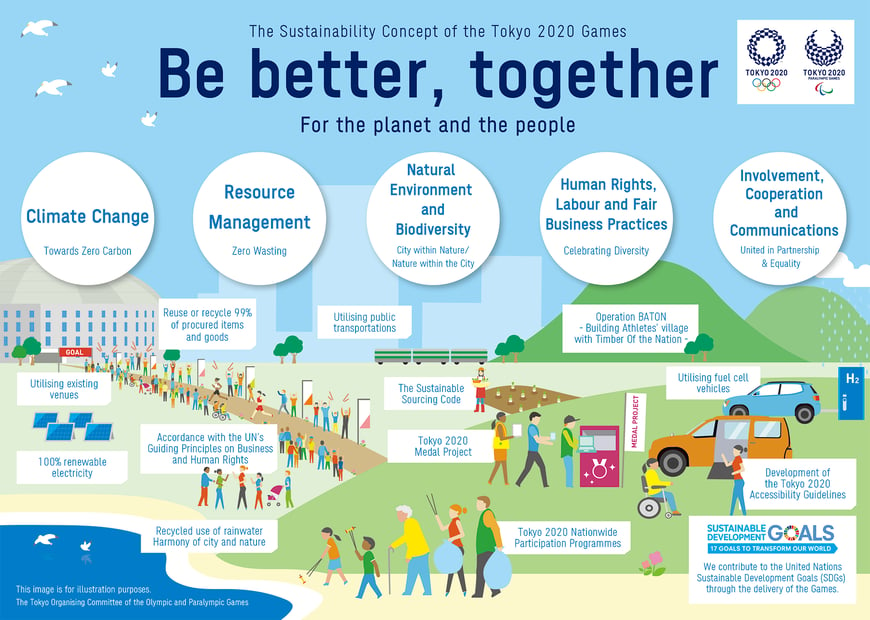Search the latest and greatest job opportunities in sport
 Throughout history sport has played a central role in the challenges and changes modern society has faced. Safeguarding peace and helping humanity overcome crises such as the one we are facing now have always been part of sports role. We are all aware that the impact of sport is not limited to sport itself, but also on society, the economy and the environment. In arguably our biggest challenge of them all, tackling climate change and promoting sustainability, sport once again aims to rise the occasion. However the challenge is great. Sport’s carbon footprint is considerable with significant environmental impact. For example, The 2018 FIFA Men’s World Cup resulted in around 2.1 million metric tonnes of carbon dioxide emissions according to FIFA’s reports, equivalent to the emissions from around 456,500 cars over one year.
Throughout history sport has played a central role in the challenges and changes modern society has faced. Safeguarding peace and helping humanity overcome crises such as the one we are facing now have always been part of sports role. We are all aware that the impact of sport is not limited to sport itself, but also on society, the economy and the environment. In arguably our biggest challenge of them all, tackling climate change and promoting sustainability, sport once again aims to rise the occasion. However the challenge is great. Sport’s carbon footprint is considerable with significant environmental impact. For example, The 2018 FIFA Men’s World Cup resulted in around 2.1 million metric tonnes of carbon dioxide emissions according to FIFA’s reports, equivalent to the emissions from around 456,500 cars over one year.
"Change is happening within the IOC, within the games and across the Olympic movement,"
Michelle Lemaître, head of sustainability at the IOC.
Change is underway, in 2018 the International Olympic Committee (IOC) including ‘sustainability in sports’ as one of the three strategic pillars set in the Body's Agenda 2020 vision. The Paris 2024 committee has set the goal to tackle sustainability challenges and become the “most sustainable Games ever” and the postponed Tokyo 2020 is planning for carbon neutrality by prioritising renewal energies.
“For us it is quite simple. Our vision is to be the most sustainable Games ever.”
Tony Estanguet, head of Paris 2024 Committee
 Source: Tokyo2020
Source: Tokyo2020
As we see sporting organisations and brands evolve to meet environmental and societal demands, particularly in the events sector, ‘Green’ careers focused on sustainable development are becoming more important in the future sporting landscape. The increase of these career choices within our sector will not only contribute to developing a fairer and more viable world through the conservation of natural resources and promotion of a healthy society, but also help sport fulfil its social responsibility in the most critical of all subjects, our planet.
The legacy of our current and future sporting events must be to place sustainable development above all other priorities.
Patrick Toutati, Founder and President of AMOS.
Sports ambitious goals for 2030* are for the sector to become Carbon Neutral, contribute to a reduction of physical inactivity by 15%** and to become ‘Zero Waste’. As a result career opportunities that support achieving these objectives in their diverse forms are becoming more and more visible across organisations. Opportunities at all levels are increasing be it in government, the private sector (small and medium enterprises to multinationals), non-profit organizations as well as educational environments and research centres. Particularly, we see a rapidly growing number of projects and initiatives emerge that focus specifically on sustainability solutions, thus creating an incubator for change and additional ways for professionals to embrace sustainability into their future careers.
*Paris agreement ** World Health Organisation
It is worth noting that sports journey to sustainability is continually developing and the structure still maturing. There is a clear perspective that the current COVID crisis and the ‘return of live sport’ could accelerate the creation of a more clearly defined sustainability model for organisations and specifically the sports events sector. As organisations are forced to ‘re-imagine’ the future and bring live events back after the unprecedented period of suspension, it provides an opportune time to rebuild for a sustainable future.
The current crisis has accelerated the opportunity for change and focus on a sustainable approach to sport. Sport now can rebuild to ensure positive outcomes for the future of the industry and the planet.
Barbara Teslar, Quality Director AMOS Group
The benefits of sports sustainable future are wide reaching, some of which are clear to all, such as reducing the considerable environmental impact of major sporting events. However a holistic approach to the challenge must be addressed to reach 'true sustainability' which will intern bring benefits to organisations, society and the environment at large. The continued commitment of all aspects of the sport industry to take responsibility and improve its social footprint is key in delivering true change and meeting sustainability objectives.
“True sustainability goes much further than individual projects. It is about looking closely at what you do as an organisation, the way you interact with society at large, and ensuring you have appropriate governance structures, policies and processes in place that will secure your long-term future for the benefit of your organisation, society and environment.”
IOC Guide to sustainability
Environmental action is therefore only part of the picture. Sport is a school of life, respectful of the environment but also of society at large and therefore must have ‘social’ responsibility at its core. By encouraging the equal involvement of men and women across all aspects of world sport, we fight against discrimination, we develop a sporting spirit, common goals and give meaning to solidarity. Huge developments have been made across sport in recent times and change continues to accelerate fueled by the event of 2020 as Nikes recent 'You Can't Stop Us' ad highlights.
Initiatives helping build better social responsibility within sport are helping inspire and embed change. For example Common Goal uses one percent of the salary of its members such as football players such as Juan Mata, Alex Morgan and Serge Gnabry, to support social projects around the world and help Sport be a leader for social equality. Also NBA Cares which aims to address societal needs through philanthropy, service and legacy goals and focused on listening to the community and to give back.
“When you asked our fans, it was that honest contribution, the authenticity of spending time and being involved, that mattered most. You can’t replace that piece of it.”
Todd Jacobson, NBA Senior Vice President of Social Responsibility
To bring sustainability into your future career path, there is no 'one' clear path due to the complexity and diversity of the challenge and of the industry. Set out to consider and reflect how you can contribute to addressing sports impact on the world and society and how you could help drive positive change. What could you contribute to within your existing company to drive sustainability? Do they have a CSR programme you could be involved in? Could you champion a programme to drive positive social change, however small?
Many organisations are also learning on their sustainability journey, join them by taking small steps which let you learn, build experience and make connections which will support bigger opportunities present themselves in the future.
Find more great articles to learn about the sports industry on our Learn: Knowledge Hub
Search the latest and greatest job opportunities in sport
In the world of professional sports, sponsorship represents a significant source of revenue and plays a vital role for t...
Read moreThe sports industry is a vibrant and multifaceted industry, made up of a diverse range of sectors that shape its global ...
Read morePablo Romero, director of protocol at Sevilla FC and lecturer in the UCAM Master's Degree in Sports Management, shares t...
Read more